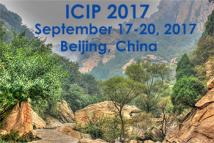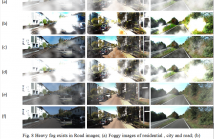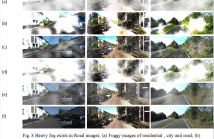
The International Conference on Image Processing (ICIP), sponsored by the IEEE Signal Processing Society, is the premier forum for the presentation of technological advances and research results in the fields of theoretical, experimental, and applied image and video processing. ICIP has been held annually since 1994, brings together leading engineers and scientists in image and video processing from around the world. Visit website.
- Read more about A Deep Learning Network for Vision-based Vacant Parking Space Detection System
- Log in to post comments
In the demonstration, we would show our live and real-time parking space detection system. The detection function is founded on a video surveillance system built in an outdoor parking lot. As we might know, it is challenging to implement a practical vision system in an outdoor environment owing to the dramatic lighting changes and uncontrollable variations from weather conditions.
- Categories:
 73 Views
73 Views- Read more about Parking Space Detection Based on A Multi-task Deep Convolutional Network with Spatial Transform
- Log in to post comments
Vacant parking space detection is a challenging vision task due to outdoor lighting variation and perspective distortion. Previous methods found on camera geometry and projection matrix to select space image region for status classification. By utilizing suitable hand-crafted features, outdoor lighting variation and perspective distortion could be well handled. However, if also considering parking displacement, non-unified car size, and inter-object occlusion, we find the problem becomes more troublesome.
- Categories:
 55 Views
55 Views- Read more about MULTI‐VIEW HUMAN ACTIVITY RECOGNITION USING MOTION FREQUENCY
- Log in to post comments
The problem of human activity recognition can be approached using spatio-temporal variations in successive video frames. In this paper, a new human action recognition technique is proposed using multi-view videos. Initially, a naive background subtraction using frame differencing between adjacent frames of a video is performed. Then, the motion information of each pixel is recorded in binary indicating existence/nonexistence of motion in the frame. A pixel wise sum over all the difference images in a view gives the frequency of motion in each pixel throughout the clip.
- Categories:
 11 Views
11 Views- Read more about Inter-Camera Tracking Based On Fully Unsupervised Online Learning
- Log in to post comments
In this paper, we present a novel fully automatic approach to track the same human across multiple disjoint cameras. Our framework includes a two-phase feature extractor and an online-learning-based camera link model estimation. We introduce an effective and robust integration of appearance and context features. Couples are detected automatically, and the couple feature is also integrated with appearance features effectively. The proposed algorithm is scalable with the use of a fully unsupervised online learning framework.
poster_2.pdf
- Categories:
 27 Views
27 Views- Read more about HYPERLAPSE GENERATION OF OMNIDIRECTIONAL VIDEOS BY ADAPTIVE SAMPLING BASED ON 3D CAMERA POSITIONS
- Log in to post comments
poster.pdf
- Categories:
 7 Views
7 Views
High accuracy is required for determining the orientation of a satellite in space. Amongst the existing sensors, a star tracker provides a very high accuracy of attitude determination. When no prior attitude is available, it operates in the “Lost-In-Space (LIS)” mode. Star pattern recognition is the most crucial part of a star tracker in the LIS mode. In this paper, a novel star pattern recognition approach is proposed, which constructs a signal from the features extracted in the star image and utilizes spearman correlation for identifying the correct stars.
POSTER.pdf
- Categories:
 15 Views
15 Views- Read more about Subspace Clustering via Independent Subspace Analysis Network
- Log in to post comments
- Categories:
 14 Views
14 Views- Read more about An Efficient Haze Removal Algorithm Using Chromatic Properties
- Log in to post comments
Heavy fog degrades the quality of road images in losing contrast and color fidelity, which may cause errors in stereo matching and road segmentation for advanced driver assistance systems (ADAS). Accident rates can be reduced if robust and efficient algorithms are applied for fog removal. Most studies have been conducted on this subject to date, but existing methods are not suitable for heavy haze conditions. Local darkness, under-estimation and over enhancement are always occurred after dehazing.
- Categories:
 15 Views
15 Views
- Read more about An Efficient Haze Removal Algorithm Using Chromatic Properties
- Log in to post comments
Heavy fog degrades the quality of road images in losing contrast and color fidelity, which may cause errors in stereo matching and road segmentation for advanced driver assistance systems (ADAS). Accident rates can be reduced if robust and efficient algorithms are applied for fog removal. Most studies have been conducted on this subject to date, but existing methods are not suitable for heavy haze conditions. Local darkness, under-estimation and over enhancement are always occurred after dehazing.
- Categories:
 28 Views
28 Views
- Read more about An Efficient Haze Removal Algorithm for Video Sequence Using Chromatic Properties
- Log in to post comments
Heavy fog degrades the quality of road images in losing contrast and color fidelity, which may cause errors in stereo matching and road segmentation for advanced driver assistance systems (ADAS). Accident rates can be reduced if robust and efficient algorithms are applied for fog removal. Most studies have been conducted on this subject to date, but existing methods are not suitable for heavy haze conditions. Local darkness, under-estimation and over enhancement are always occurred after dehazing.
- Categories:
 59 Views
59 Views